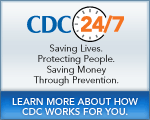CDC Reports More Cases, Hospitalizations and Nation’s First H3N2v-Associated Death
The information contained in this web update reflects the situation at the time of posting. It may not reflect the current situation. Please see Influenza A (H3N2) Variant Virus Outbreaks for the most recent information related to H3N2v.
Today, CDC is reporting 12 additional cases of H3N2 variant virus (H3N2v) infection, as well as the first H3N2v-associated death, which was reported by the state of Ohio. The death occurred in an older adult with multiple underlying health conditions who reportedly had direct exposure to pigs in a fair setting. While limited person-to-person spread of this virus has been detected and likely continues to occur sporadically, no sustained community transmission has been found. CDC is monitoring this situation and working with states to respond to these evolving outbreaks. The agency continues to urge people at high risk from serious flu complications to stay away from pigs and pig arenas at fairs this summer.
"We’re saddened to hear about the death of one person in Ohio associated with the current H3N2v outbreaks," says CDC’s Dr. Lyn Finelli. "Like with seasonal flu, we have been – and continue to be – particularly concerned about people with factors that put them at high risk of serious complications if they get the flu. These people should absolutely not have contact with pigs or visit pig arenas at fairs this summer." Dr. Finelli is Lead for the Surveillance and Outbreak Response Team in CDC’s Influenza Division.
High risk factors for serious flu complications include: being younger than 5 years (especially children younger than 2 years), or 65 and older, pregnancy, and certain chronic medical conditions like asthma, diabetes, heart disease, weakened immune systems, and neurological or neurodevelopmental conditions. A full list of high risk conditions is available on the CDC seasonal flu website.
"Anyone with a high risk factor should not only avoid pigs and pig arenas at fairs, but they should also seek prompt medical attention if they get flu-like symptoms, especially if they have pig exposure, but even in the absence of pig exposure," Finelli says.
CDC has issued information for clinicians on H3N2v; guidance which underscores the importance of rapid antiviral treatment of influenza, including H3N2v virus infection, in high risk patients. The H3N2v virus is susceptible to the influenza antiviral drugs oseltamivir (Tamiflu ®) and zanamivir (Relenza ®).
For seasonal flu, CDC recommends that it is best that people with high risk conditions who develop flu-like symptoms contact their doctor, tell them about their symptoms, and remind them about their high risk status. For the current H3N2v outbreaks, if high risk people have exposure to pigs, it’s especially important that they tell their doctor about this exposure.
"Like with seasonal flu," Finelli says, "prompt antiviral treatment in a high risk person can mean the difference between having a milder illness versus a very serious illness that could result in a hospital stay or even death," says Finelli. "This message is critical not only for people who are at high risk, but for America’s doctors who are treating these patients. We want their suspicion for H3N2v to be high right now. Ask patients with influenza-like-illness if they have pig exposure, but regardless of whether they do, if they have a high risk factor, treat them empirically with antivirals for influenza without waiting for testing results."
The 12 new cases reported this week are from the states of Minnesota (1), Ohio (3), Pennsylvania (1), and Wisconsin (7). Cumulative totals for 2011 and 2012 by state are available in the H3N2v case count table.
Symptoms of H3N2v have been consistent with seasonal influenza and can include some or all of the following: fever, cough, sore throat, runny or stuffy nose, muscle or body aches, headaches and fatigue. Like with seasonal flu, it’s possible that not everyone will have a fever. This may be particularly true in elderly people or people with weakened immune systems, whose bodies may not mount as effective an immune response to the virus infection.
Found in U.S. pigs in 2010 and humans in July 2011, this H3N2v virus appears to spread more easily from pigs to people than other variant influenza viruses. Most reported cases to date have occurred in people who are exhibiting or helping to exhibit pigs at fairs this season after close and prolonged contact with pigs. "So far more than 90 percent of cases have occurred in people who are exhibiting or helping to exhibit pigs, or who are family members of these people. That is why our message is so targeted," says Finelli. CDC has developed recommendations and materials for people attending fairs this summer and is working with states as well as organizations like 4-H National Headquarters and the International Association of Fairs and Expositions to disseminate these messages and materials.
CDC also has developed supplemental H3N2v guidance for schools. Last year, there was at least one outbreak of H3N2v in a day care setting in the fall and CDC believes it possible that localized outbreaks of H3N2v, particularly in schools or day cares, may occur as the weather turns colder and schools across the country are underway. "The guidance document is a heads up for schools to be aware of, and on the look-out for, illness with this virus," Finelli explains.
"It’s important to remember that this is an evolving situation that could change quickly." Finelli concludes, "We’re constantly looking at our data and re-evaluating."
Contact Us:
- Centers for Disease Control and Prevention
1600 Clifton Rd
Atlanta, GA 30333 - 800-CDC-INFO
(800-232-4636)
TTY: (888) 232-6348 - cdcinfo@cdc.gov



